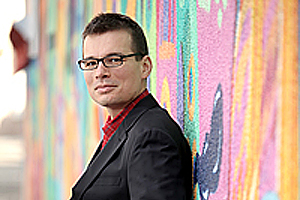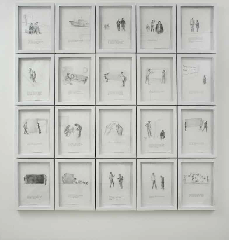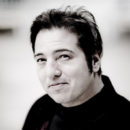
Alexandru Tomescu
I have seen photos of him. Yet, when he comes through the door of the agreed upon teahouse, he still manages to surprise me. Alexandru Tomescu. The most famous Romanian violinist of our times. His voice is calm, soft enough that I constantly readjust the volume on my voice recorder. Over the next couple of hours, he systematically destroys every myth related to his profession. And it all started with such a mundane question…
How does one become such an internationally renowned violinist at such a young age? 1976 wasn’t that many years ago.
I wish I could define it, come up with a formula. “Do this and this and that and there you go: successful violinist!” But I’m not sure. I think for any of us, violinist, artist, what have you, it comes down to a personal choice, a personal path and a personal discovery. There are way too many variables to be able to include them all in a formula for success. Back when I was just starting, I remember there were all these so called “recipes” going around, the must-have qualities of violinists and astronauts. Astronauts, apart from everything else, needed cavity free teeth, and I already had a couple, so I gave up on that career path during my school years. Physical stamina is still a requirement, though, when, for instance, you’re in an extended tour, or you have to perform every night, sometimes even twice in one day. Sure, it might not sound like too great an effort to make, but when you have to go through one or two months of that, it really takes it out of you. And you start to contemplate the global view – not strictly the music aspect, but also how that music fits in your body, your physique. And then… then there’s the need to be ready for the long hours. I mean that repetitive work, the never-ending study. My mother used to have this very young girl for a pupil, six or seven years old, and she said the cutest thing. She wanted to know at what age she’ll stop having to do the scales. My mother replied: Look, Alexandru is 36 and he still does his scales. Whaaaat? In 30 years I’ll still be doing scales?! There are also issues that have to do with each violinist’s hygiene. The moment you start avoiding some of them, things start to decay. Not instantaneously, but in time. And that is why the time allotted for study is every violinist’s health indicator.
Fair enough, but how do things get going? What’s the main ingredient: talent or the parents’ decision?
Neither. It’s the love for playing. Enjoying it – that has to be the spark that kindles it all.
At five or six years of age?
That’s right. You know how intense children’s enjoyment is, and also their conscientiousness? A thoroughness even university students lack. But there’s also playfulness. Serious playfulness. You remember when we were kids, we used to play Dacians and Romans? It was game play, but serious game play; we were really putting our hearts into those games. That is how it all started for me, too. The violin was a toy other children, like my mother’s students whom I would be around at concerts and competitions, were allowed to play with. And I kept insisting. Give me, give me, let me play too. Well, at first they wanted me to study piano, but in the end, the violin won… Talent? I personally believe there’s talent in each one of us, buried more or less deep in there. But talent alone is not enough. Or at least in my case, it took a great deal of constant work. I don’t believe in lotteries. The “go figure – he doesn’t work, doesn’t study, has no long term plan, but he’s got TALENT, and talent’s enough” kind of lotteries, I mean. Natural ability can only take you so far. If your aim is to have a 10, 20, 30 years career, it takes more.
And a parents’ choice, often enough, has nothing to do with the child’s choice. The former decide for the latter, based on what they wish they had chosen for themselves back when they were young. But, surprise surprise, that child is a distinct individual, even though he’s your child. He’s his own person. There are children who are obedient and, for a while, sometimes longer, sometimes shorter, they live out their parents’ dream. But eventually they realize it’s not what they truly want, and that’s were change comes in. The point is there has to be this joy, this inner energy that, of course, starts as game play. And it’s important for that initial joy to last and gain new dimensions over the course of one’s entire life. For performing musicians, the choice of instrument comes very early, perhaps around four or five years of age. With other professions, the equivalent choice doesn’t occur until the late teens. By that age, for us it’s more of a confirmation of our childhood choice, and bringing new meanings to it. That can either simplify or complicate things.
Who made you work the hardest by the time you became a full grown artist: your mother or your teachers?
My mother never made me work. I’m afraid I’m going to have to shatter the romantic image brought forth by Paganini, that of his father hitting him over his fingers whenever he made a mistake – smack smack! That’s an image that caught on rather well, and people expect it to get perpetuated. They imagine me having had a tormented childhood, maybe locked away in a dark cellar, alone with my violin, having water lowered down to me in a bucket. Well, no, it was exactly the opposite. I actually wanted to study and I was looking forward to my mom coming home from work so we could have our daily hour of violin practice. I didn’t overdo it either. I started with one hour a day, then a couple, then three… I took it gradually. I couldn’t have been forced into doing something I didn’t want to. My mother didn’t just take me through childhood, but also through the next seven years of learning violin, crucial ones for a violinist. Those are the years for foundation laying, and if that’s not done well, if it comes out awry and the angles are all wrong, the best you can hope for afterwards is to make adjustments; the building will still be crooked. It’s a huge piece of good fortune having a great professor from the very beginning. Sadly, many violin teachers, it seems to me, tend to look down on taking on children. Perhaps they lack the patience, or maybe they think it’s beneath their pedagogical range. But that’s where they’re most needed, as that’s where it all begins. Following the seven years with my mother, I went on to become maestro Ștefan Gheorghiu’s longest lasting pupil. I attended his class for eleven, if not twelve years. In fact, we remained very close friends throughout the rest of his life. I then took quite a few specialized training classes, mostly with career violinists, as I wanted to find out first hand what it was all about, what were the sought after traits. But a top violinist is not necessarily a top tutor. Those are two different callings. And the moment I took off was when I graduated from the Conservatoire and completed my studies abroad and there was no one left to tell me what to do or how to play. The time came for me to figure what good came out of everything I had done thus far.
Did you feel at all lost at that point?
Nonononono, I was very fortunate to have brilliant teachers who allowed me to grow. Good teachers slowly fade out of their student’s life, and let him make his own decisions. Maybe they point out, here and there, whether they approve or not of his choices, but they no longer choose for him. I went through a great deal of experimenting. I still am in fact. In our line of business, things are never set in stone. That’s why they call it “interpretation”. We interpret those pieces left to us by the likes of Bach, Beethoven, Brahms or Tchaikovsky. People are used to some things being immutable. Some ask “What’s the best way to play Tchaikovsky?” That’s a hard question to answer. If it was athletics we were talking about, the best way to run the hundred meters flat is to run the fastest. That’s open and shut. But a concert, a piece… speed can work for or against you, and it’s definitely not an absolute criterion. The criteria for evaluating a performance are much more subtle than that, much more complex and yet, at the same time, much more simple. Mostly, it boils down to “I like it or I don’t”. And that can be explained a thousand different ways, or none at all.
What we’re actually talking about is constantly reinventing every piece of music. There are pieces that have in them this sap, this resource that makes them bear well in all kinds of reinterpretations – much like with pop music, and cover songs. I strongly believe that classical music has this vivacity to it, otherwise I think it would have been long dead. Bach remains Bach, whether it’s played on a baroque, modern or even electric violin. You can put a jazz tune to it, or hip-hop, and it will still be Bach. Which is what I aim to do with musical pieces, because once you’ve completed the killer stage of learning the piece, once the technical issues are out of the way, then the interpreter finds himself in a creative position. Once you’ve got the piece down, most people would tend to think that’s that. If you’re able to reproduce whatever’s written there in the sheet, the piece is ready. But that’s just where it gets interesting, where your personality makes its mark. Anybody can learn a piece. Bach, Beethoven, they’ve all written the indications there – faster, slower, harder, softer. But that’s not the point. Once this “programming” is processed, you have to incorporate the piece, to get it into yourself, into your blood. And you become a creator, you now have the power to model, to play with it, to take it where no man has dared to take it before.
That sounds a bit like Star Trek…
Yeah, I really enjoyed Star Trek, too. And music can take you even farther than that.
Full interview








